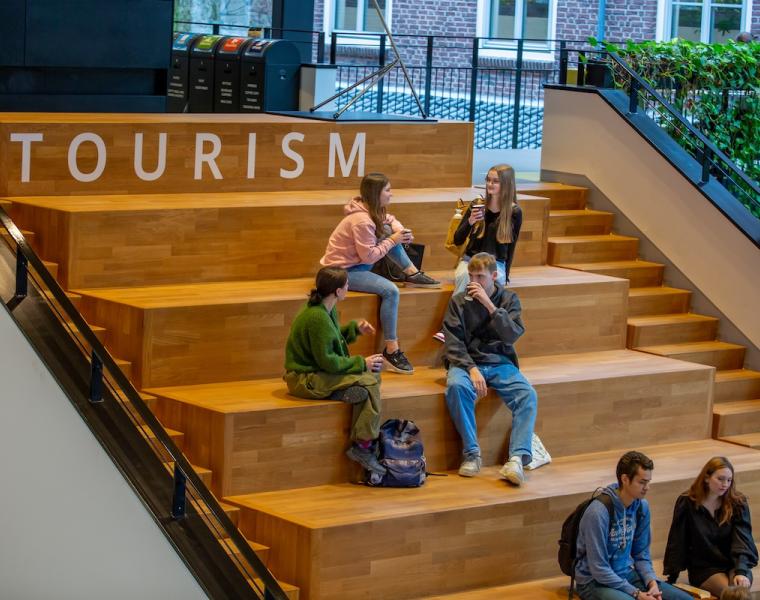The good, the bad and the ugly
As theme manager 'Education', I link CELTH's Conscious Destinations Agenda (ABB) to education. The challenges we face in the hospitality domain are important for students to understand. But conversely, those students are at least as important for meeting those challenges. These young people can more easily let go of 'old ideas' and develop something new. This is needed more today than ever.
I have been a lecturer at the tourism academy of Breda University of Applied Sciences (BUas) for about 20 years. But I'm a bit lost now. When I started, tourism was mainly something fun; I was one of the few teachers who was allowed to point out to students the negative side of tourism. Consider, for example, how tourism income leaks from a destination, gentrification or commodification through tourism. I liked that. When I did that, I saw young people waking up and developing a fighting spirit. But that no longer works. If I try to point out something negative in my class, I will lose my class. I also see this same mechanism when I give a guest lecture elsewhere, such as recently at Stenden. I tried to explain the relevance and complexity of the themes of CELTH's Conscious Destinations Agenda. And I felt the energy in the class drop and that was not disinterest in destination management. Complexity has always been something that students 'assumed', especially if it remained too abstract, but now complexity seems to be downright discouraged, especially if it is accompanied by the less attractive side of tourism. At the same time, I do want them to understand the difficult edges and frayed edges of tourism. Even in research projects, I see this 'paralysis'. Research reports must also be positive, otherwise, the message will not get through to professionals and policymakers. I understand that I also sometimes consider not reading the newspaper anymore and behaving more like an ostrich and avoiding the bad feeling.
Still, I'm bummed about it. I want to discuss both the pleasant and the uncomfortable. I don't think one can happen without the other. If we don't understand what's going wrong and how it all fits together, isn't it difficult to do better? It seems to me that we must look the beast in the mouth and thereby also face the whole reality. By 'whole' I mean not only the ugly but also the beautiful. When I ask why students find it so difficult to talk about the problems (or no, sorry: 'challenges') in tourism, it is not that they do not recognise the need for it. They say they don't want to hear it; they don't want to be reminded of it. 'Too discouraging' was the message. That paralyses me myself, but yes, that doesn't help either them or me.
So, I am looking for a new approach and perspective for action, for both myself and my students, i.e. future entrepreneurs, managers and policymakers. The idea of 'active hope' appeals to me. Active hope is about the willingness to discover strengths within us and others (such as the students) (Macy and Johnstone, 2023, p.51). Strength is also love. This means that I am now also on a journey to discover what my strengths are so that I can better support students in this. Likewise, recognising that the transitions we are facing are painful seems to me to be helpful. As Angela Stoof explains beautifully in her book Perspective; firstly, the pain we feel when we become aware of problems such as climate change, secondly the pain we will feel if we must change (for example less meat and fewer flies) and as a bonus the pain we experience because not everyone agrees on the solution. (Stoof, 2024: p. 30). This helps me to be gentler with my students who are going into lockdown. Moreover, simply expressing that this pain exists also gives the student space to allow this pain to exist. In addition, I learned from teaching at Performative (social innovation) about the opportunities that 'liminality' offers: Yes, we are in a strange phase in which we realise that the old no longer works, a phase full of discomfort and confusion. But that is also a phase from which creation can take place. Complexity not only means that it is difficult, but also that there are multiple entry points for change. This may be hopeful for both teacher and student.
I haven't finished either book yet, but I'm starting to enjoy my search. I too, as a teacher and as a researcher, am going through a transition. Hopefully, this will contribute to supporting students who also must figure out how to deal with 'the good, the bad and the ugly' in the hospitality domain.
Ellen de Groot
Theme Manager Education
References:
Macy, J., & Johnstone, C. (2023). Active hope: How to face the mess we're in with unexpected resilience and creative power (Revised edition). New World Library.
Stoof, A. (2024). Perspectief: Hoop houden en verschil maken in een wereld vol verandering. Zilt.



